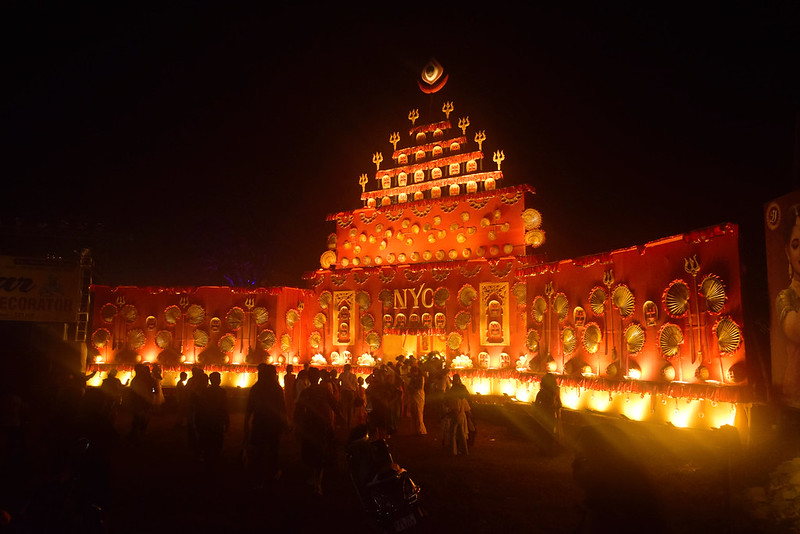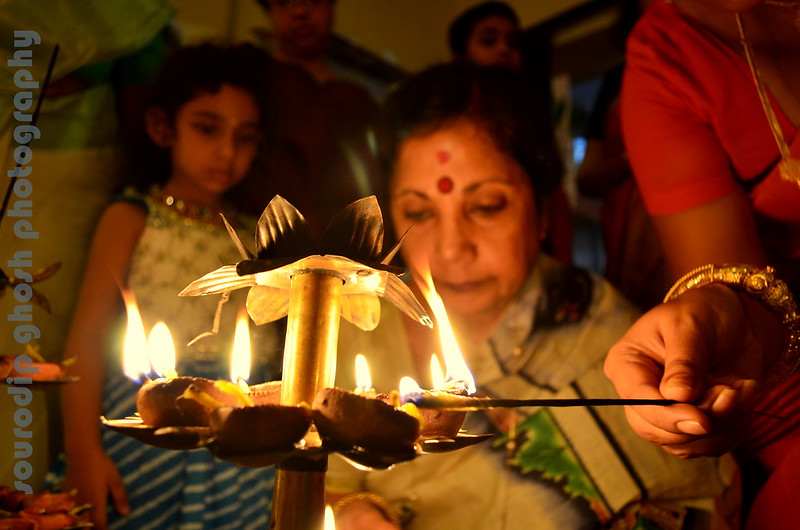Kali Puja
A Night of the Goddess and Prayers Illuminating Bengal
2026/11/05
Every autumn, on the new moon night of the month of Kartik, the streets of Bengal are enveloped in countless lights, devotional songs, and powerful art. On Kali Puja night, the air is filled with the scent of incense and hibiscus as devotees gather in sparkling pandals (temporary shrines) to worship the fearsome yet compassionate goddess Kali. This festival, where spiritual energy and community excitement intersect, is an unforgettable experience for anyone wanting to feel the “living soul” of Bengal.
Kali Puja is held annually on the new moon of the Hindu month of Kartik (usually October or November). While centered in West Bengal, it is also celebrated in Assam, Odisha, Tripura, Bihar, and Bangladesh, attracting locals, spiritual seekers, and curious travelers all looking to experience Bengal’s most energetic night of the year.
Main Attractions
All-Night Rituals and Worship of the Goddess
The heart of Kali Puja is the midnight worship of the goddess Kali. Her striking idol—with dark skin, wild hair, and a garland of skulls—sits at the center of a beautifully decorated pandal. Devotees, dressed in red or orange, offer hibiscus flowers, rice, lentils, fish, coconut, and more. The rhythms of drums and mantras, the glow of oil lamps, and the fragrance of incense fill the night with a sacred atmosphere.
Pandal-Hopping and Illuminations
Across Bengal, neighborhoods compete to create the most beautiful pandals. Colorful lights, artistic decorations, and themed displays brighten the night streets, and visitors wander from pandal to pandal, enjoying the creativity and festive excitement. The feel of flower petals, the night breeze, and the warmth of lamps stimulate all the senses.
Traditional Food and Offerings
Food plays a major role in Kali Puja. Offerings (bhog) include khichuri (rice and lentils), fried fish, sweets like sandesh and rasgulla, and fruits. The aroma of ghee, coconut, and spices drifts from homes and street stalls, and after the rituals, it’s common for families and friends to enjoy a midnight meal together.
Costumes and Decorations
Devotees wear red saris or kurtas, symbolizing strength and auspiciousness. Kali idols are decorated with hibiscus garlands, gold ornaments, and sometimes real weapons. Pandals are adorned with marigolds, banana leaves, and rangoli (colored powder art), while flickering oil lamps cast mysterious shadows on the goddess’s face.
Cultural and Historical Background
Kali Puja originated in the 16th century, when Tantric scholar Krishnananda Agamavagisha first formally worshipped the goddess in Bengal after a divine vision. During the Bengal Renaissance of the 18th and 19th centuries, the festival spread as a symbol of strength, rebellion, and feminine power. Today, it is Bengal’s second largest festival after Durga Puja, and Kali is revered as a goddess of both fear and compassion, protection and liberation.
Participant Voices
"I was born and raised in Kolkata, but Kali Puja night feels special every year. The whole city glows with lights, and the sound of dhak drums echoes until morning. Offering hibiscus to Ma Kali always makes me feel protected." — Priya, local resident
"I came from Mumbai and was amazed by the artistry of the pandals and the warmth of the people. Sharing midnight bhog with a family and talking about Kali’s many forms was an unforgettable experience." — Anil, visitor
"For me, Kali Puja is about facing my fears. My grandmother taught me that Kali destroys both the darkness within and without. Lighting lamps and chanting mantras with my neighbors, I feel both humble and strong." — Rina, student
Fun Facts
- Kali Puja is held on the same day as Diwali, but while most of India worships Lakshmi, Bengal worships Kali.
- The red hibiscus is a symbol of Kali and is always offered to her.
- Kali Puja is also known as Shyama Puja or Mahanisha Puja in different regions.
Festival Dates
Kali Puja is held every year on the new moon night in October or November, mainly in West Bengal and eastern India. Dates are based on the Hindu lunar calendar.
The event schedule is subject to change. Please check the official website for the most up-to-date information.
Information
| Name | Kali Puja |
| Country | India |
| Area | West Bengal |
| Date | 2026/11/05 |
| Link |
Upcoming Festivals
Kukeri(Surva) Bulgaria
Bulgaria’s Festival of Spirits, Fire, and Bells That Drives Away Winter
2026/01/22Dinagyang Philippines
Iloilo’s Thunderous Festival of Faith, Tradition, and Dance
2026/01/22The Northern Lights Festival (Nordlysfestivalen) Norway
A Tromsø Miracle: Music and Aurora Dancing in the Arctic Night
2026/01/25Carnavales de Ituren y Zubieta Spain
Ancient Echoes and the Festival that Awakens Spring in the Basque Mountains
2026/01/26Up Helly Aa United Kingdom
A Night When Fire and Viking Pride Blaze in Shetland
2026/01/29Winterlude Canada
A Wonderland of Ice, Light, and Smiles in Canada’s Capital Region
2026/01/30Carnival of Viareggio (Carnevale de Viareggio) Italy
A Spectacular Parade of Giant Papier-Mâché Masterpieces
2026/01/30Fiesta de la Candelaria(Virgin of Candelaria) Peru
A Grand Dance Festival of Faith and Folklore Echoing on the Shores of Lake Titicaca
2026/01/31Thaipusam Malaysia
A Pilgrimage of Prayer and Penance Illuminates Batu Caves
2026/01/31Jaisalmer Desert Festival India
When Rajasthan’s Golden Dunes Dazzle with Color and Culture

